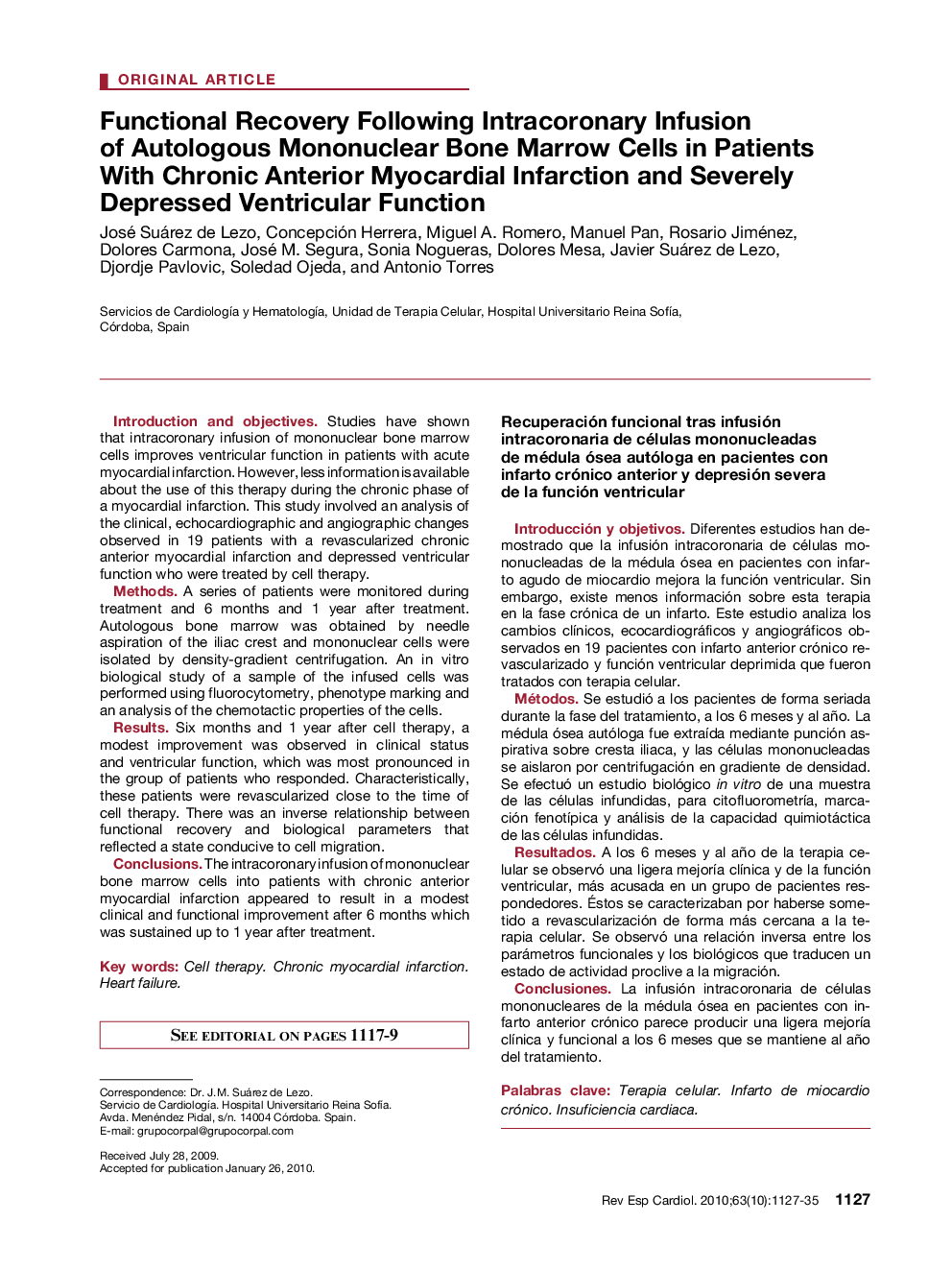| Article ID | Journal | Published Year | Pages | File Type |
|---|---|---|---|---|
| 3017080 | Revista Española de Cardiología (English Edition) | 2010 | 9 Pages |
Introduction and objectivesStudies have shown that intracoronary infusion of mononuclear bone marrow cells improves ventricular function in patients with acute myocardial infarction. However, less information is available about the use of this therapy during the chronic phase of a myocardial infarction. This study involved an analysis of the clinical, echocardiographic and angiographic changes observed in 19 patients with a revascularized chronic anterior myocardial infarction and depressed ventricular function who were treated by cell therapy.MethodsA series of patients were monitored during treatment and 6 months and 1 year after treatment. Autologous bone marrow was obtained by needle aspiration of the iliac crest and mononuclear cells were isolated by density-gradient centrifugation. An in vitro biological study of a sample of the infused cells was performed using fluorocytometry, phenotype marking and an analysis of the chemotactic properties of the cells.ResultsSix months and 1 year after cell therapy, a modest improvement was observed in clinical status and ventricular function, which was most pronounced in the group of patients who responded. Characteristically, these patients were revascularized close to the time of cell therapy. There was an inverse relationship between functional recovery and biological parameters that reflected a state conducive to cell migration.ConclusionsThe intracoronary infusion of mononuclear bone marrow cells into patients with chronic anterior myocardial infarction appeared to result in a modest clinical and functional improvement after 6 months which was sustained up to 1 year after treatment.
Introducción y objetivosDiferentes estudios han demostrado que la infusión intracoronaria de células mononucleadas de la médula ósea en pacientes con infarto agudo de miocardio mejora la función ventricular. Sin embargo, existe menos información sobre esta terapia en la fase crónica de un infarto. Este estudio analiza los cambios clínicos, ecocardiográficos y angiográficos observados en 19 pacientes con infarto anterior crónico revascularizado y función ventricular deprimida que fueron tratados con terapia celular.MétodosSe estudió a los pacientes de forma seriada durante la fase del tratamiento, a los 6 meses y al año. La médula ósea autóloga fue extraída mediante punción aspirativa sobre cresta iliaca, y las células mononucleadas se aislaron por centrifugación en gradiente de densidad. Se efectuó un estudio biológico in vitro de una muestra de las células infundidas, para citofluorometría, marcación fenotípica y análisis de la capacidad quimiotáctica de las células infundidas.ResultadosA los 6 meses y al año de la terapia celular se observó una ligera mejoría clínica y de la función ventricular, más acusada en un grupo de pacientes respondedores. Éstos se caracterizaban por haberse sometido a revascularización de forma más cercana a la terapia celular. Se observó una relación inversa entre los parámetros funcionales y los biológicos que traducen un estado de actividad proclive a la migración.ConclusionesLa infusión intracoronaria de células mononucleares de la médula ósea en pacientes con infarto anterior crónico parece producir una ligera mejoría clínica y funcional a los 6 meses que se mantiene al año del tratamiento.
